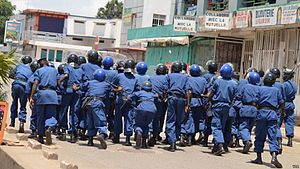Burundian unrest (2015–present)
| 2015 Burundian protests | ||||
|---|---|---|---|---|
 |
||||
| Date | 26 April 2015 – present (1 year, 10 months, 1 week and 2 days) |
|||
| Location | Bujumbura, Burundi | |||
| Causes |
|
|||
| Methods |
|
|||
| Status |
|
|||
| Parties to the civil conflict | ||||
|
||||
| Lead figures | ||||
|
||||
| Casualties | ||||
| Death(s) | 474 (per UN) 800-900 (according to expert) |
|||
| Detained | 5,000 | |||
Burundian Opposition
Government of Burundi
On 25 April 2015, the ruling political party in Burundi, the National Council for the Defense of Democracy – Forces for the Defense of Democracy (CNDD-FDD), announced that the incumbent President of Burundi, Pierre Nkurunziza, would run for a third term in the 2015 presidential election. The announcement sparked protests by those opposed to Nkurunziza seeking a third term in office.
Widespread demonstrations in the capital, Bujumbura, lasted for over three weeks. During that time the country's highest court approved Nkurunziza's right to run for a third term in office despite the fact that at least one of the court's judges fled the country claiming he had received death threats from members of the government. As a result of the protests the government also shut down the country's internet and telephone network, closed all of the country's universities and government officials publicly referred to the protesters as "terrorists". Since late April tens of thousands of people have fled the country, hundreds of people have been arrested and several protesters and police have been killed while dozens more have been injured.
On 13 May, a coup was announced, led by Major General Godefroid Niyombare, while President Nkurunziza was in Tanzania attending an emergency conference about the situation in the country. By the next day the coup collapsed and government forces reasserted control. On 11 December, almost 90 people were killed in attacks on state targets.
The Burundian Civil War lasted from 1993 to 2005, and an estimated 300,000 people were killed. The conflict ended with a peace process that brought in the 2005 constitution providing guaranteed representation for both Hutu and Tutsi, and parliamentary elections that led to Pierre Nkurunziza, from the Hutu FDD, becoming President.
...
Wikipedia
